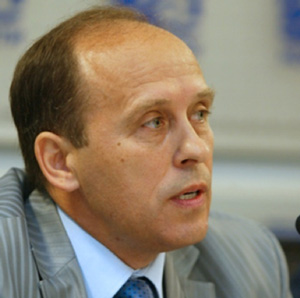
Georgia Rejects FSB Chief’s Charges of Supporting Terrorism in the North Caucasus
Publication: Eurasia Daily Monitor Volume: 6 Issue: 189

Georgian officials have denied accusations made by the head of Russia’s main security agency that Georgian special services have aided al-Qaeda-linked terrorists in Russia’s North Caucasus.
Federal Security Service (FSB) Director Aleksandr Bortnikov, who also heads Russia’s National Anti-Terrorist Committee (NAK), claimed during an NAK meeting October 13 that the committee had seized “audio” evidence from militants in the North Caucasus showing that that they, together with “al-Qaeda” emissaries, established contacts with representatives of Georgia’s special forces who “participated in the training and transfer of terrorists to the territory of Chechnya.” Bortnikov also charged that Georgia is constantly attempting to “deliver weapons, explosives and financing for subversive acts on high-security sites in Dagestan –first and foremost on oil and gas pipelines.”
Bortnikov said that since July, 19 terrorist attacks had been averted and the activities of 178 “bandits” cut short in Russia, including those of “a certain ‘Doctor Muhammed’ who comes from Algeria and whom al-Qaeda sent to Russia to coordinate terrorist activities in Dagestan.” Still, the FSB chief said that despite steps taken by local authorities, militants in the North Caucasus have stepped up their activities, resulting in an increase in the number of attacks on law-enforcement and security officials. He also said that rebels have revived the practice of using suicide bombers, adding that a suicide bomber who had planned to carry out an attack during Moscow’s City Day celebrations had been detained (www.vesti.ru, Interfax, ITAR-TASS, October 13).
Georgian officials immediately and vociferously denied Bortnikov’s charges. “It is an absurd, baseless, ridiculous statement, but it is not new in terms of Russian propaganda,” Georgian National Security Council Secretary Eka Tkeshelashvili told the Reuters news agency (Reuters, October 13).
Georgia’s foreign ministry said on October 13 that Russia’s claims that Georgia had aided al-Qaeda were “utterly false” and a cause for “serious concern.”
In a statement posted on its website, the ministry said Bortnikov’s accusations were part of a “hysterical campaign” being carried out by the Russian government “to accuse Georgia of creating the catastrophic situation in the North Caucasus, for which Russia itself is to be blamed.” The statement added: “The propaganda noise stirred up by the Kremlin on the normalization and stabilization of the situation [in North Caucasus] has failed to cover up the actually existing disastrous situation in the region, in particular, the fact that the conflict raging in the North Caucasus has entered its most acute stage. The Kremlin is aware that its attempts to bring the situation under control are vain and [by] employing [already] tested Soviet methods [it] tries to disguise its hopelessness by using the factor of an external enemy.”
The allegations against Georgia were the product of “fevered brains,” the Georgian foreign ministry said. “To meet its own imperialistic demands, the Kremlin will use any pretext in order to maximally [stir up] tension across the Georgian borders and create a suitable background for carrying out military provocations against the peaceful democratic country,” the statement continued.
The Gazeta.ru website quoted the speaker of Georgia’s parliament, David Bakradze, as telling journalists that the only place in Georgia where there are “illegal armed formations” – the standard Russian term for rebel groups – is in the breakaway regions of Abkhazia and South Ossetia, and that those particular groups are pro-Russian. “The problem for Georgia in this context is Abkhazia and Tskhinvali and those illegal formations that were created by Moscow’s own hands,” Bakradze said. “Today Russia faces the danger of an explosion in this region, and it needs to find an excuse,” he explained. The website quoted Tkeshelashvili as saying it could not be ruled out that Bornikov’s statement was deliberately timed to coincide with U.S. Secretary of State Hillary Clinton’s meeting in Moscow with Russian Foreign Minister Sergei Lavrov, which also took place on October 13.
One of the leaders of Georgia’s opposition, Irakli Alasaniya, said that if Bortnikov was claiming that Georgia was hosting terrorists in the Pankisi Gorge, that region is closed off to terrorists. “During the time that I was deputy minister for state security, a counter-terrorist and anti-criminal operation was carried out there, as a result of which there are no longer armed formations or persons suspected of connections with terrorists organizations located there,” Gazeta.ru quoted Alasaniya as saying. “I think these accusations are groundless. However, it is obvious that the Russian Federation is starting a new information war,” Alasaniya continued. Nika Laliashvili, the head of the Christian Democratic faction in Georgia’s parliament, predicted that the next step by Russia would be a military strike on Georgia (www.gazeta.ru, October 14).




